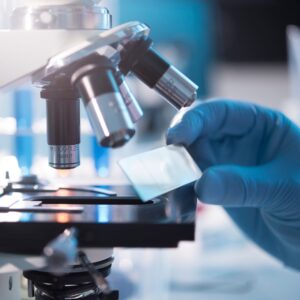
Allied health professions cover a large amount of medical fields. Nearly every department requires some form of technician or technologist to aid physicians or specialists. One type of specialized lab technician are histotechnologists—but what is their field and why are they vital for medical laboratories and pathologists?
What is histotechnology?
Histotechnology is the science of studying tissue abnormalities using microscopic detections. Basically, histotechnology is a medical area that assists pathologists in their diagnoses and treatment of diseases. Histotechnologists (HTLs) prepare slides of tissue samples for examination, which includes adding any chemical agents or dyes to better view the specimen under a microscope.
The work of HTLs is vital for understanding and diagnosing any conditions a patient has. They don’t always work solely in a hospital towards patient care. HTLs might also work in private labs or academic facilities to conduct research and tests. HTLs maintain equipment and a controlled environment.
HTLs are specialized in biopsies of certain organs, staining, electron microscopy, and more.
How do I become a histotechnologist?
The American Society for Clinical Pathology (ASCP) offers certification programs for histotechnologists. Websites like Mometrix offer free practice tests for histotechnologists.
To qualify for the HTL exam, the ASCP offers four avenues for applicants:
- Obtain a bachelor’s degree from a regionally accredited college/university. You need 30 semester hours in chemistry and biology. You must also complete a histotechnologist program accredited by the NAACLS within the last five years.
- Obtain a bachelor’s degree in the appropriate field. Have one year of full-time clinical experience in a histopathology lab within the last five years. or one year of full time research/industry/veterinary experience in a histopathology lab.
- Have a valid HT(ASCP) certification and a bachelor’s degree in the appropriate field. Must also have six months’ worth of clinical/research/industry/veterinary experience in a histopathology lab.
- Obtain a bachelor’s degree in the appropriate field. Complete a 50-week histotechnician training course from the U.S. military within the last 10 years.
The examination for HTLs contain 100 multiple-choice questions with a 2.5 hour time limit. It is also split into five sections:
- Fixation
- Processing
- Embedding/Microtomy
- Staining
- Laboratory Operations
In addition, the histotechnologist exam contains a few more aspects geared towards scientific principles and theories, along with management and regulations.
How much does a histotechnologist make?
The ASCP reported that the mean hourly wage for HTLs was $31.27 ($65,042 a year).
The Bureau of Labor Statistics estimates employment of clinical laboratory technologists/technicians will grow 5% from 2022 to 2032. Basically, about 24,000 openings for clinical laboratory technologists and technicians will appear each year.
Although not specific to histotechnologists, their estimate reflects the general job outlook for specialty roles within laboratories.
What are the continuing education requirements for histotechnicians/histotechnologists?
HTLs must complete 36 hours of continuing education (CE) every three years to maintain certification. The NSH offers programs that allow HTLs to complete 12 hours each year.
Find Your Next Travel Histotechnology Job with BHS
Ready for your next adventure? Check out our job board to see open positions for histotechnologists!